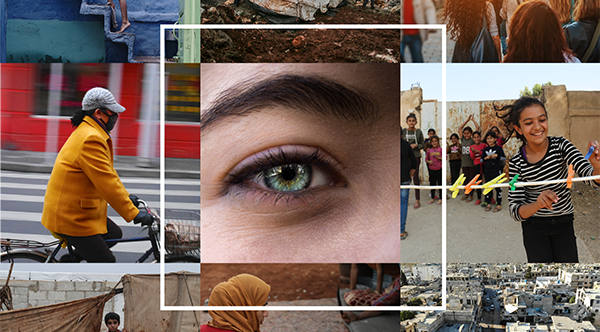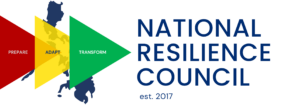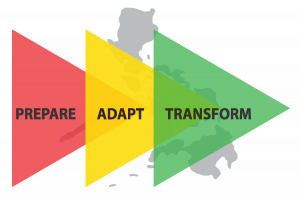In the newsletter circulated by United Nations Office for Disaster Risk Reduction (UNDRR), UN Secretary-General’s Special Representative for Disaster Risk Reduction Mami Mizutori writes an update on the on-going efforts and initiatives by DRR Organizations and Advocates in the fight against COVID-19.
There is worldwide recognition that the fight against COVID-19 will mainly take place in our cities and towns. The denser the population, and the more informal the human settlement, the more likely it is that the virus will spread.
In my opinion piece, with the Executive Director of UN-Habitat, Maimunah Mohd Sharif, we highlight the fact that some 95% of COVID-19 cases have come from urban areas where pandemic preparedness is more urgent than ever, particularly in challenging situations where disease outbreaks could coincide with an extreme weather event.
It was a theme that I revisited in a webinar organized by our Panama Regional Office The cities of the Americas and the Caribbean facing COVID-19: Resilient Cities. A major economic contraction could plunge 28 million people in the region into poverty in one of the world’s most urbanized regions.
Later this year, the Making Cities Resilient Campaign will be succeeded by an initiative joining forces with UN-Habitat, the World Bank, UCLG, ICLEI, and other partners to shift the focus from advocacy to implementation of local DRR strategies to enhance local resilience over the next decade.
In my recent remarks to the Executive Bureau of UCLG I highlighted three focus areas:
- First, provide advisory support for improved and risk-informed investment and development planning, climate finance, municipal finance, and climate adaptation;
- Second, improve coordination between national and local governments and national associations of local governments for risk reduction measures,
- And third, forge strong partnerships at the local level for more efficient implementation of policies for local resilience.
The lack of funding has been identified as the biggest challenge in building local resilience and we hope this broadened engagement will help cities to overcome this. We also want to enhance city-to-city exchanges and mentoring amongst local governments at different stages of development.
RESPONSE, RECOVERY AND PREVENTION
The International Recovery Platform (IRP) has produced a useful compendium for COVID-19 Pandemic Recovery comprising 21 tools and guidelines for Health Sector Recovery; Private Sector and Livelihood Recovery; Inclusive Recovery; and Disaster Recovery Governance.
Recovery from COVID-19 must seek to build the resilience of public and private systems and the sooner we start planning to factor in biological hazards and risks in national and local DRR strategies (Sendai Framework Target (e), the better.
The wider recovery effort will require multisectoral participation to address a range of issues that are also relevant for many other types of disaster (e.g. infrastructure, education, governance, commerce). The unprecedented nature of the current disaster requires consideration of new approaches in order to recover better.
The COVID-19 Recovery Policy Brief for decision and policymakers defines the COVID-19 recovery context and supplements existing guidance with key principles and practices to guide recovery planning.
LEARNING AND GUIDANCE
Work is continuing through our Regional Offices to ensure national strategies are aligned with the Sendai Framework on the inclusion of biological hazards and risks.
For instance, our Regional Office for Asia and the Pacific has completed a review of 22 existing national strategies to examine the level of integration of biological hazards. The Office is now moving to interviews with country Sendai Framework focal points to understand and support countries in strengthening their risk management governance.
Similar review processes are underway in all other Regional Offices.
Given the concentration of COVID-19 cases in urban settings, the Regional Office for Arab States has developed a questionnaire on cities’ role in preparing and responding to COVID-19.
PARTNERING AND SHARING
We recently disseminated the UNDRR Statement by the Stakeholder Engagement Mechanism on “Applying Lessons from COVID-19 Prevention and Risk Reduction to Build a Sustainable and Resilient World”. It calls on government leaders to:
- Implement a preventive approach as we build back better.
- Commit to protect the most vulnerable.
- Strengthen multilateralism based on long-term vision, democratic values, human rights, health equity, accessibility, social justice, and respect for nature.
- Provide messaging consistent with medical advice and ensuring that harmful misinformation is quickly countered.
- Encourage appropriate individual action.
The Statement reads: “Despite the disruption and suffering caused by COVID-19, we are provided with a rare opportunity to develop case studies, lessons learned and policy guidelines on the risk management of the pandemic and share them globally. It also will lead us to revisit much that underpins our modern world – from governance, investment, production, and consumption, to our relationship with nature and each other, placing risk reduction at its heart.
ADVOCACY
The UN Secretary-General has appointed Ricardo Mena as the new Director of UNDRR. Ricardo has a wealth of disaster response and DRR knowledge from his field and HQ experiences. He joined UNDRR as head of our Regional Office for the Americas and the Caribbean in 2009. Since 2017 he has been chief of branch in charge of Supporting and Monitoring the Implementation of the Sendai Framework. In his new role as my deputy, Ricardo is well-positioned to become an even stronger advocate on behalf of DRR.
Do check out our ongoing series of blog posts under DRR Voices on PreventionWeb. Dr. Rahel Steinbach highlights how gender and age are decisive factors influencing people’s ability to prevent, prepare for and recover from COVID-19 and its consequences. PhD researcher, Sapana Basnet Bista, has four recommendations for inclusive risk communication. Dr. Aaron Clark-Ginsberg writes about How DRR can help reduce elderly loneliness during the pandemic.
#PreventionSavesLives
I hope that you will find this update useful and informative.
If you would like more information about UNDRR’s many activities, please do visit www.undrr.org and please — stay safe and well.

![]()


